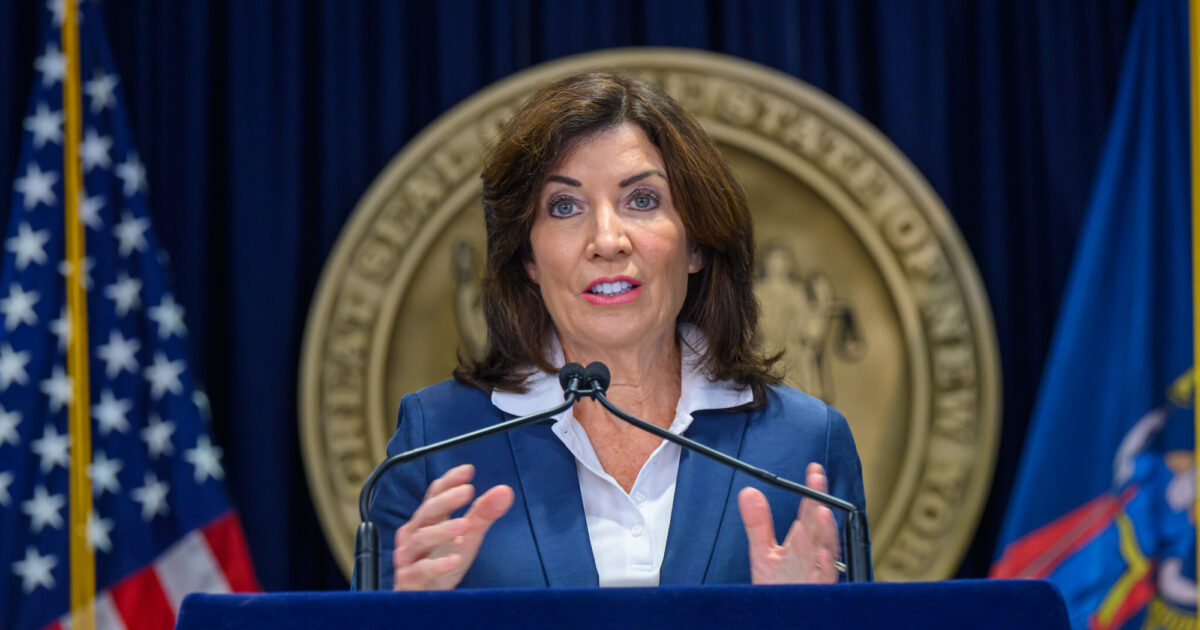At a press conference Thursday, Governor Kathy Hochul refused to commit to achieving the reductions in air pollution and traffic that congestion pricing, which she indefinitely paused in June, was slated to produce.
Since her abrupt decision to put the years-in-the-making plan on hold punched a $15 billion hole in the budget of the Metropolitan Transportation Authority, Hochul has maintained that she will devise a replacement plan to fully fund the MTA and all of its planned upgrades and improvements.
The governor has declined to provide any details about how this will happen. And while she has suggested that she is working with the legislature to find a solution, key legislators said they aren’t aware of any active conversations between the governor and legislature on the issue.
In addition to providing funding for the MTA, congestion pricing was supposed to improve air quality and reduce record-high gridlock in downtown Manhattan and its surroundings, which are among the most congested urban areas in the world.
The tolling program would have reduced greenhouse gas emissions in downtown Manhattan by 11 percent and traffic by 17 percent, according to an MTA study.
Asked by New York Focus if she is still dedicated to meeting those metrics, Hochul merely stated that she is “committed to ensuring that there are benefits for the people who live in those areas.”
She then pivoted to the cost of congestion pricing for car owners in the Central Business District, the area of Manhattan below 60th street where the toll would have applied.
“Actually, people live in those areas who would have to pay an additional $15 to travel in and out of their own homes. That is an extraordinary cost,” she said.
Eighty percent of Central Business District residents live in households that do not own cars, according to the U.S. census.
State Senator Liz Krueger, who represents part of the Central Business District, said that Hochul declining to commit to congestion pricing’s planned environmental and traffic benefits is a “major concern.”
“Until now, she’s kept saying that we’re going to come up with an alternative that addresses those issues,” said Krueger, who has been a vocal critic of the pause.
Assemblymember Tony Simone, who also represents part of the Central Business District, sharply criticized Hochul’s statement.
“The governor has created a situation in which traffic and air quality conditions continue to worsen, and offers no solution to these crises,” he said. “Meanwhile, she is digging under the couch cushions for pennies for the MTA.”
Traffic accidents have killed far more people than gun violence in New York City so far this year, Gothamist reported in June.

Governor Hochul at a press conference on Thursday
| Sam Mellins
New York Focus also asked Hochul why the $15 toll would be a greater economic hardship than the $30.50 cost of a round-trip train ticket from Tarrytown, a Westchester suburb, to Grand Central Terminal in Midtown.
Hochul suggested it was a cherry-picked example.
“I’m talking about people coming in from all over, not just that one train example that you’re using. People are coming in from other places, and it is expensive to ask them to pay this,” she said.
Almost all train fares from New York City’s suburbs cost more than $15. Peak-hour train tickets to Manhattan from Long Island’s suburbs cost a minimum of $26 round trip. It costs $16.60 to make a round trip from Montclair, New Jersey, to Penn Station during peak hours.
“To Governor Hochul’s surprise, many New Yorkers spend more than $15 every day to commute by train,” said Danny Pearlstein, policy director of the mass transit advocacy group Riders’ Alliance. “It’s absurd to block billions of dollars for public transit because of affordability without knowing the commuting costs that New Yorkers actually pay.”
On Tuesday, Hochul promised that the MTA’s funding issues would be “resolved in a few months” and said that “everybody will have clarity on what the path is going forward with the legislature.”
Several legislators said they’re unaware of any progress toward a replacement program.
“I read that she was talking to some people in the legislature about some new plan. So I called up my leader, who said, ‘She hasn’t talked to me about it,’” Krueger said, referring to Senate Democratic Majority Leader Andrea Stewart-Cousins.
Senator Brad Hoylman-Sigal and Assemblymember Harvey Epstein, who represent parts of the Central Business District, also said they aren’t aware of any active discussions between the governor and legislators about replacements for congestion pricing.
Most New Yorkers have an unfavorable view of congestion pricing. But Krueger said that the specter of dozens of canceled upgrades to subway, bus, and train infrastructure has turned some former opponents of the program into supporters.
“Even people in my district who had been publicly opposing congestion pricing forever,” she said, “now they’re calling and saying, ‘Okay, we thought we really didn’t want congestion pricing. This is so much worse. Tell her to go forward.’”


